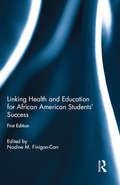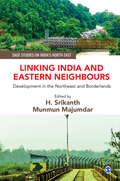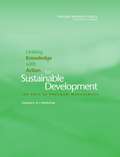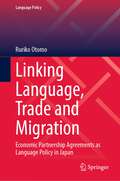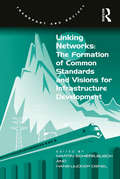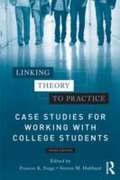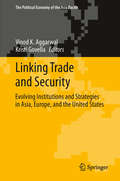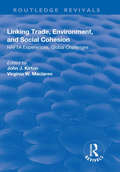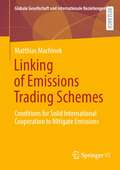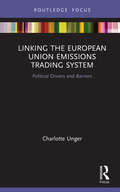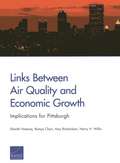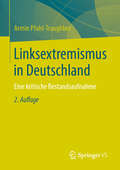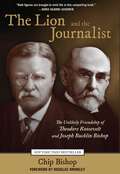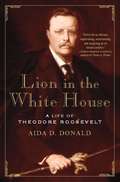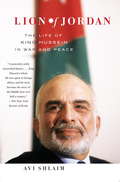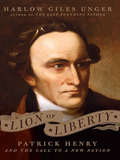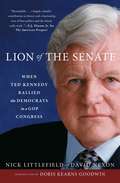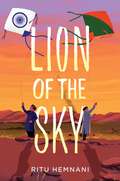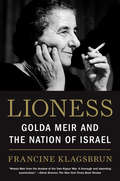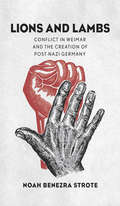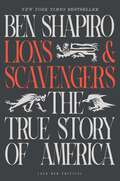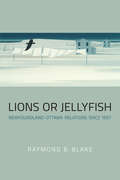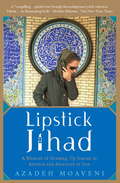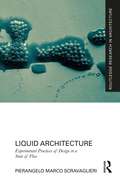- Table View
- List View
Linking Health and Education for African American Students' Success
by Nadine M. Finigan-CarrThe linkages between a student’s health and a student’s ability to learn have been well established. Children who are sick stay home; and, children at home cannot learn if they are not in school leading to increased dropout rates among other educational outcomes. However, an understanding of this concept is just the beginning of understanding how education and public health are inextricably linked. In light of this, Linking Health and Education for African American Students’ Success examines health disparities and education inequities simultaneously and moves beyond a basic understanding of health and education in K-12 school programs. The structural inequalities which lead to reduced academic attainment mirror the social determinants of health. Education is one of the most powerful determinants of health, and disparities in educational achievement as a result of structural inequalities closely track disparities in health. These disparities lead to both sub-standard healthcare and reduced academic attainment among children from underserved minorities in the United States, especially African Americans. This book discusses how this may result in children with poorer mental health outcomes; higher school dropout rates; increased risks of arrests and incarceration; higher rates of chronic diseases and mortality; and overall diminished opportunities for success, while providing suggestions as to how to address these issues. This results in an insightful read for researchers, academics and practitioners in the fields of healthcare and education.
Linking India and Eastern Neighbours: Development in the Northeast and Borderlands (SAGE Studies on India′s North East)
by H. Srikanth Munmun MajumdarLinking India and Eastern Neighbours: Development in the Northeast and Borderlands studies different aspects of India’s bilateral relations with neighbouring countries and discusses implications of development initiatives in India’s northeastern region (NER) and its borderlands. The NER shares borders with five countries. The central government has shown interest in developing infrastructure in the NER, and state governments are taking initiatives to promote trade relations with the bordering countries. The book discusses the causes for underdevelopment and examines the initiatives taken to overcome the problems of the land-locked region. It provides a comprehensive account of varied processes at work in India’s northeastern borderlands. The book looks closely at the lifeworld of the border communities and myriad cross-border interactions. It throws light on the economic potentiality and preparedness of the NER, the significance of border haats, diverse manifestatsions of border crossing and nature of inter-ethnic interactions. The book also explains the theoretical significance and practical relevance of studying border processes.
Linking Knowledge with Action for Sustainable Development: THE ROLE OF PROGRAM MANAGEMENT
by National Research Council of the National AcademiesThis report summarizes a workshop organized by the National Academies’ Roundtable on Science and Technology for Sustainability. The workshop brought together a select group of program managers from the public and private sectors to discuss specific cases of linking knowledge to action in a diverse set of integrated observation, assessment, and decision support systems. Workshop discussions explored a wide variety of experiments in harnessing science and technology to goals of promoting development and conserving the environment. Participants reflected on the most significant challenges that they have faced when trying to implement their programs and the strategies that they have used to address them successfully. The report summarizes discussions at the workshop, including common themes about the process of linking knowledge with actions for sustainable development that emerged across a wide range of cases, sectors, and regions.
Linking Language, Trade and Migration: Economic Partnership Agreements as Language Policy in Japan (Language Policy #33)
by Ruriko OtomoThis book examines the effect of trade policy on language which represents an underrecognized area in the field of language policy and planning. It argues that trade policies like Japan’s Economic Partnership Agreements (EPAs) have important consequences for national language (education) policies and for discourses about language and nation. Since 2008, Japan has signed the EPAs with Indonesia, the Philippines and Vietnam to recruit migrant nurses and eldercare workers and manage their mobility by means of pre-employment language training and the Japanese-medium licensure examinations. Through the analysis of these language management devices, this book demonstrates that the EPAs are a manifestation and representation of contemporary language issues intertwined particularly with pressing issues of Japan’s social aging and demographic change. As the EPAs are intertwined with welfare, economy, social cohesion, and international political and economic relations and competitiveness, the book presents a far more complex picture of and a richer potential of language policy.
Linking Networks: The Formation Of Common Standards And Visions For Infrastructure Development (Transport And Society Ser.)
by Hans-Liudger DienelPresenting recent research on the international integration of infrastructures in Europe, this book combines general and methodological chapters and examples from different a variety of sectors such as transport, electricity and communication networks. Particular focus is on the contrast between the 'Europe of nation states' of the nineteenth century (up to 1914) and the emerging 'integrated Europe' after World War II. Additional contributions provide perspectives from beyond Europe. The wide range of topics gives a good overview of the different challenges posed and the strategies employed in each sector to establish internationally compatible networks, procedures and standards. This work strengthens comparative research as a complement to the detailed analysis of singular cases that often characterises previous works in this field. Methodologically, it therefore contributes to the progress of tools and strategies for comparative historical research. Part of the emerging research area dealing with the mechanisms of international collaboration, this book brings together recent research from European integration history, policy studies, political economy and cultural studies. Considering the growing intensity of international collaboration and exchange in many parts of social and economic life, it is also of topical interest.
Linking Theory to Practice: Case Studies For Working With College Students (Third Edition)
by Frances K. Stage Steven M. HubbardFramed by an overview of theories that guide student affairs practice, the cases in this book present a challenging array of problems that student affairs and higher education personnel face, such as racial diversity, alcohol abuse, and student activism. The revised edition has thirty new cases, with content on issues that reflect the complexity of today's environment at colleges and universities, including the expanded use of social networking, the rise in mental health issues, bullying, study abroad, and athletics. The fully updated edition includes new references, expanded theory with an increased emphasis on race, ethnicity, and sexual orientation, and three entirely new chapters on admissions, student identity, and campus life. An excellent teaching tool, this book challenges students to consider multiple overlapping issues within a single case study. Features include: A two-part structure that sets the stage for case study methods and links student affairs theory with practical applications Cases written by well-known and respected contributors set in a wide variety of institution types and locations Over 35 complex case studies reflecting the multifaceted issues student affairs professionals face in today's college environment.
Linking Trade and Security
by Vinod K. Aggarwal Kristi GovellaThe connections between trade and security are hardly new. Analysts and practitioners have clearly recognized this interrelationship since the mercantilist arguments of the 16th and 17th centuries. Despite wishful economic liberal thinking that might prefer to separate the political from the economic, it is widely recognized that trade and security are fundamentally interconnected in the foreign policy of states. Over time, as new forms of trade policy have come into being and the international security environment has evolved, the nexus of these two spheres has grown more complex and scholars have struggled to understand their interconnection This edited volume addresses linkages between trade and security by examining the influence of security factors in driving trade policy measures and the corresponding implications of different types of trade arrangements for international security. Ultimately, the project shows that several elements--traditional economic factors, traditional security factors, and human security factors--can affect the development of trade agreements and unilateral policies, and that trade policies may have both a direct and an indirect effect on traditional and human security. The project focuses on Asia, a region where economics is increasingly important but many security issues still linger unresolved, as a primary setting to test trade linkage theories. It also provides a comparative perspective through examination of how the EU and US have used their trade policies to achieve non-economic goals and how these policies have influenced their security environment. Case studies in this project cover key trade institutions and agreements including the World Trade Organization, the Association of Southeast Asian Nations, ASEAN Plus Three, the East Asia Summit, the Asia-Pacific Economic Cooperation forum, the Shanghai Cooperation Organization, and bilateral preferential trade agreements.
Linking Trade, Environment, and Social Cohesion: NAFTA Experiences, Global Challenges (Global Environmental Governance Ser.)
by John J. Kirton Virginia W. MaclarenThis title was first published in 2002: Focusing on the central issues of the contemporary trade-environment-social cohesion debate, this compelling book analyzes the social and environmental impacts of existing trade liberalization through the World Trade Organization (WTO), North American Free Trade Agreement (NAFTA) and other key regimes. It also explores new strategies for regulation and risk assessment, environmental information, standard setting, voluntary activities, sustainability assessments of trade agreements, and participation by civil society. Features include: -suggests ways in which the NAFTA model might be improved -explores the NAFTA regime with regards to its environmental and social impacts -evaluates the experience and improvement of NAFTA and how it might assist the broader international community Characterized by its meticulous scholarship and fluid style, this authoritative work is an indispensable guide for all those concerned with trade liberalization, environmental enhancement and social cohesion.
Linking of Emissions Trading Schemes: Conditions for Solid International Cooperation to Mitigate Emissions (Globale Gesellschaft und internationale Beziehungen)
by Matthias MachinekAnthropogenic Climate Change is one of the biggest challenges of the 21st century and receives more and more international awareness. The central instruments to counter climate change are emissions trading schemes (ETS) to cover GHG emissions. To increase efficiency and to ensure global reduction of emissions damaging to the climate, an international emissions trading scheme would be a rational choice. To establish such a global scheme, political decision makers could follow a bottom-up-approach by linking already existing ETS with each other. The book investigates such linkings of emissions trading schemes, which provide many benefits for the linking partners. As experience shows, although the number of schemes increased in the last decade, only a few linkings were established. Thus, the book answers the question, if and which conditions for states exist to link their emissions trading schemes. .
Linking the European Union Emissions Trading System: Political Drivers and Barriers (Routledge Focus on Environment and Sustainability)
by Charlotte UngerThis book focuses on the linking of the European Union Emissions Trading System (EU ETS) with other independent regional ETS. While rich practical and academic research has evolved on the economic and technical side of ETS linking, political drivers and barriers have so far been underrepresented in this debate. Filling this lacuna and based on international relations theory, existing research and qualitative fieldwork, this book introduces the range of political conditions that influence linking, such as political leadership and stakeholder activity. Specifically, it analyzes which of these aspects have played a role in three different linking activities of the EU: (1) a failed linking attempt: EU ETS–California Cap-and-Trade Program; (2) a successful linking treaty: EU ETS–Switzerland Emissions Trading System; and (3) an agreed-upon but not realized link: EU ETS–Australia Carbon Pricing Mechanism. Through an interrogation of these examples, Dr. Unger concludes that it is not only the technical challenges or the overall economic benefit but rather domestic interests, structural aspects, and external international political developments that have jointly dominated linking activities, especially those in which the EU takes part. This book will be of great interest to scholars and policy-makers working in climate policy and EU environmental politics.
Links Between Air Quality and Economic Growth: Implications for Pittsburgh
by Henry H. Willis Amy Richardson Shanthi Nataraj Ramya ChariThis report assesses the evidence that exists for the ways in which local air quality could influence local economic growth through health and workforce issues, quality-of-life issues, or air-quality regulations and business operations. It then extrapolates some of the existing results to the Pittsburgh region.
Linksextremismus in Deutschland: Eine kritische Bestandsaufnahme
by Armin Pfahl-TraughberIn den 1970er und 1980er Jahren kam der Entwicklung des Linksextremismus in der öffentlichen und wissenschaftlichen Wahrnehmung große Bedeutung zu. Angesichts eines höheren Gefahrenpotentials des islamistischen und rechten Extremismus schwand diese Aufmerksamkeit in den letzten Jahren. Indessen lassen sich nach wie vor einschlägige politische Bestrebungen – wenn auch mit anderer Bedeutung – ausmachen. Dieses Buch, das für die 2. Auflage aktualisiert wurde, versteht sich als kritische Bestandsaufnahme zum Linksextremismus in Deutschland: Es präsentiert die relevanten Informationen über Auffassungen und Handlungen und schätzt sie hinsichtlich bestimmter Aspekte und Gesichtspunkt ein. Dabei werden häufig politisch motivierte Dramatisierungen oder Verharmlosungen zugunsten einer differenzierten Sicht auf das Gefahrenpotential des Linksextremismus vermieden.
Lion and the Journalist: The Unlikely Friendship of Theodore Roosevelt and Joseph Bucklin Bishop
by Chip BishopA New York Times BestsellerTheodore Roosevelt, accidental president, and Joseph Bishop, newspaper editor, met when the future Rough Rider was police commissioner of New York City. This is the remarkable story of mutual loyalty and dedication that ranges from police corruption on the streets of New York, through days of boldness and courage in the White House, to ambition and hardship in the jungles of Panama and beyond.
Lion in the White House: A Life of Theodore Roosevelt
by Aida DonaldNew York State Assemblyman, Assistant Secretary of the Navy, Governor of New York, Vice President and, at forty-two, the youngest President ever--in his own words, Theodore Roosevelt "rose like a rocket. ” He was also a cowboy, a soldier, a historian, an intrepid explorer, and an unsurpassed environmentalist. In Lion in the White House, historian Aida Donald masterfully chronicles the life of this first modern president. TR’s accomplishments in office were immense. As President, Roosevelt redesigned the office of Chief Executive and the workings of the Republican Party to meet the challenges of the new industrial economy. Believing that the emerging aristocracy of wealth represented a genuine threat to democracy, TR broke trusts to curb the rapacity of big business. He built the Panama Canal and engaged the country in world affairs, putting a temporary end to American isolationism. And he won the Nobel Peace Prize--the only sitting president ever so honored. Throughout his public career, TR fought valiantly to steer the GOP back to its noblest ideals as embodied by Abraham Lincoln. Alas, his hopes for his party were quashed by the GOP’s strong rightward turn in the years after he left office. But his vision for America lives on. In lapidary prose, this concise biography recounts the courageous life of one of the greatest leaders our nation has ever known.
Lion of Jordan: The Life of King Hussein in War and Peace
by Avi ShlaimFor most of his long reign (1953-1999) Hussein of Jordan was one of the dominant figures in Middle Eastern politics, and one of the most consistent proponents of peace with Israel. This is the first major account of his life and reign, written with access to many of his surviving papers, with the co-operation (but not approval) of his family and staff, and extensive interviews with policy-makers of many different nationalities. Shlaim reveals that for the sake of dynastic and national survival, Hussein initiated a secret dialogue with Israel in 1963, and spent over 1000 hours in talks with Golda Meir, Shimon Peres, Itzhak Shamir, Itzhak Rabin, and countless other Israeli officials. Shlaim reconstructs this dialogue across the battle-lines from new Israeli records and first-hand accounts by many of the key participants, demonstrating that Israeli intransigence was largely responsible for the failure to achieve a peaceful settlement to the conflict between 1967 and 1994.
Lion of Liberty: Patrick Henry and the Call to a New Nation
by Harlow Giles UngerIn this action-packed history, award-winning author Harlow Giles Unger unfolds the epic story of Patrick Henry, who roused Americans to fight government tyranny—both British and American. Remembered largely for his cry for “liberty or death,” Henry was actually the first (and most colorful) of America’s Founding Fathers—first to call Americans to arms against Britain, first to demand a bill of rights, and first to fight the growth of big government after the Revolution. As quick with a rifle as he was with his tongue, Henry was America’s greatest orator and courtroom lawyer, who mixed histrionics and hilarity to provoke tears or laughter from judges and jurors alike. Henry’s passion for liberty (as well as his very large family), suggested to many Americans that he, not Washington, was the real father of his country. This biography is history at its best, telling a story both human and philosophical. As Unger points out, Henry’s words continue to echo across America and inspire millions to fight government intrusion in their daily lives.
Lion of the Senate
by David Nexon Nick Littlefield"The best book I have read about the inner dynamics of the United States Senate." --Doris Kearns GoodwinTwo top domestic policy advisors to Senator Edward Kennedy offer an insider's view of several remarkable years when Kennedy fought to preserve the Democratic mission against Newt Gingrich's Contract with America and a Republican majority in both houses--a story that has special resonance now as a resurgent Republican right once again controls Congress. In November 1994 the election swept a new breed of Republicans into control of the United States Congress. Led by Speaker Newt Gingrich, the Republicans were determined to enact a conservative agenda that would reshape American government. Had it not been for Ted Kennedy, they would have succeeded. In 1994, after defending his Senate seat against challenger Mitt Romney, Kennedy came back to Washington to find Democrats, including President Clinton, demoralized and leaning toward "compromises" that would adopt much of the Republican agenda. Undaunted, Kennedy pressed the agenda he would have championed had his party held power. He rallied the Democrats. He reached across the aisle to craft and pass key progressive legislation. And he stopped the Gingrich revolution in its tracks. Nick Littlefield and David Nexon tell this story of a bare-knuckled and sometimes hilarious fight in the United States Senate. It is a political lesson for all time.
Lion of the Sky
by Ritu HemnaniAn evocative historical novel in verse about a boy and his family who are forced to flee their home and become refugees after the British Partition of India. Perfect for fans of Other Words for Home. Twelve-year-old Raj is happiest flying kites with his best friend, Iqbal. As their kites soar, Raj feels free, like his beloved India soon will be, and he can’t wait to celebrate their independence.But when a British lawyer draws a line across a map, splitting India in two, Raj is thrust into a fractured world. With Partition declared, Hindu, Sikh, and Muslim families are torn apart—and Raj’s Hindu and Iqbal’s Muslim families are among them.Forced to flee and become refugees, Raj’s family is left to start over in a new country. After suffering devastating losses, Raj must summon the courage to survive the brutal upheaval of both his country and his heart.Inspired by the author’s true family history, Lion of the Sky is a deeply moving coming-of-age tale about identity, belonging, and the power of hope.
Lioness: Golda Meir and the Nation of Israel
by Francine KlagsbrunThe definitive biography of the iron-willed leader, chain-smoking political operative, and tea-and-cake-serving grandmother who became the fourth prime minister of Israel Golda Meir was a world figure unlike any other. Born in tsarist Russia in 1898, she immigrated to America in 1906 and grew up in Milwaukee, where from her earliest years she displayed the political consciousness and organizational skills that would eventually catapult her into the inner circles of Israel's founding generation. Moving to mandatory Palestine in 1921 with her husband, the passionate socialist joined a kibbutz but soon left and was hired at a public works office by the man who would become the great love of her life. A series of public service jobs brought her to the attention of David Ben-Gurion, and her political career took off. Fund-raising in America in 1948, secretly meeting in Amman with King Abdullah right before Israel's declaration of independence, mobbed by thousands of Jews in a Moscow synagogue in 1948 as Israel's first representative to the USSR, serving as minister of labor and foreign minister in the 1950s and 1960s, Golda brought fiery oratory, plainspoken appeals, and shrewd deal-making to the cause to which she had dedicated her life—the welfare and security of the State of Israel and its inhabitants. As prime minister, Golda negotiated arms agreements with Richard Nixon and Henry Kissinger and had dozens of clandestine meetings with Jordan's King Hussein in the unsuccessful pursuit of a land-for-peace agreement with Israel's neighbors. But her time in office ended in tragedy, when Israel was caught off guard by Egypt and Syria's surprise attack on Yom Kippur in 1973. Analyzing newly available documents from Israeli government archives, Francine Klagsbrun looks into whether Golda could have prevented that war and whether in its darkest days she contemplated using nuclear force. Resigning in the war's aftermath, she spent her final years keeping a hand in national affairs and bemusedly enjoying international acclaim. Klagsbrun's superbly researched and masterly recounted story of Israel's founding mother gives us a Golda for the ages.
Lions and Lambs: Conflict in Weimar and the Creation of Post-Nazi Germany
by Noah Benezra StroteA bold new interpretation of Germany’s democratic transformation in the twentieth century, focusing on the generation that shaped the post-Nazi reconstruction Not long after the horrors of World War II and the Holocaust, Germans rebuilt their shattered country and emerged as one of the leading nations of the Western liberal world. In his debut work, Noah Strote analyzes this remarkable turnaround and challenges the widely held perception that the Western Allies—particularly the United States—were responsible for Germany’s transformation. Instead, Strote draws from never-before-seen material to show how common opposition to Adolf Hitler united the fractious groups that had once vied for supremacy under the Weimar Republic, Germany’s first democracy (1918-1933). His character-driven narrative follows ten Germans of rival worldviews who experienced the breakdown of Weimar society, lived under the Nazi dictatorship, and together assumed founding roles in the democratic reconstruction. While many have imagined postwar Germany as the product of foreign-led democratization, this study highlights the crucial role of indigenous ideas and institutions that stretched back decades before Hitler. Foregrounding the resolution of key conflicts that crippled the country’s first democracy, Strote presents a new model for understanding the origins of today’s Federal Republic.
Lions and Scavengers: The True Story of America (and Her Critics)
by Ben ShapiroINSTANT NEW YORK TIMES BESTSELLER #1 New York Times bestselling author Ben Shapiro examines the current state of America and Western civilization, and poses a question: will we be Lions, or will we be Scavengers? In a world split between noble Lions and destructive Scavengers, only the brave can lead the way. Acclaimed writer and conservative thought leader Ben Shapiro knows that at the heart of today&’s conflicts—political, economic, and cultural—there&’s a dangerous lie: that all people are equal in ability, and that all inequality stems from oppression and exploitation.With his signature clarity and sharp insight, Shapiro refutes that lie, emphasizing that in a free country, inequality is rooted in differences of talent and work ethic—not oppression—and that the best solution to lack of success lies in duty and virtue. Lions, like America&’s founding fathers, strive for the highest good, building systems that promote freedom, prosperity, and equality of opportunity. Meanwhile, Scavengers degrade these ideals, spreading resentment and entitlement that threaten to dismantle the foundations of Western civilization.In Lions and Scavengers, Shapiro invites you to take up the mantle of the Lion and defend the principles that shape the freedom of a fair, powerful society. With the stakes higher than ever, this book is a gripping exploration of the ongoing war between those who cherish our nation and those who seek to undermine it. The triumph of the Lions is essential for America&’s continued success. It&’s a rallying cry for those who refuse to bow to the Scavengers&’ demands. It&’s time to fight back.
Lions or Jellyfish
by Raymond B. BlakeAsked in 2010 about his pugnacious approach to federal-provincial relations, Newfoundland premier Danny Williams declared "I would rather live one more day as a lion than ten years a jellyfish." He was only the latest in a long line of Newfoundland premiers who have fought for that province's interests on the national stage. From Joey Smallwood and the conflict over Term 29 of the Act of Union to Williams and his much-publicized clashes with Paul Martin and Stephen Harper, Newfoundland and Labrador's politicians have often expressed a determination to move beyond a legacy of colonialism and assert greater control over the province's own affairs.Lions or Jellyfish? examines the history of these federal-provincial clashes with both clarity and wit. Written by a noted expert on Newfoundland politics and intergovernmental affairs in Canada, this book studies a vital but frequently overlooked aspect of modern Canadian federalism.
Lions under the Throne
by Stephen SedleyFrancis Bacon wrote in 1625 that judges must be lions, but lions under the throne. From that day to this, the tension within the state between parliamentary, judicial and executive power has remained unresolved. Lions under the Throne is the first systematic account of the origins and development of the great body of public law by which the state, both institutionally and in relation to the individual, is governed.
Lipstick Jihad: A Memoir of Growing up Iranian in America and American in Iran
by Azadeh MoaveniAs far back as she can remember, Azadeh Moaveni has felt at odds with her tangled identity as an Iranian-American. In suburban America, Azadeh lived in two worlds. At home, she was the daughter of the Iranian exile community, serving tea, clinging to tradition, and dreaming of Tehran. Outside, she was a California girl who practiced yoga and listened to Madonna. For years, she ignored the tense standoff between her two cultures. But college magnified the clash between Iran and America, and after graduating, she moved to Iran as a journalist. This is the story of her search for identity, between two cultures cleaved apart by a violent history. It is also the story of Iran, a restive land lost in the twilight of its revolution. Moaveni's homecoming falls in the heady days of the country's reform movement, when young people demonstrated in the streets and shouted for the Islamic regime to end. In these tumultuous times, she struggles to build a life in a dark country, wholly unlike the luminous, saffron and turquoise-tinted Iran of her imagination. As she leads us through the drug-soaked, underground parties of Tehran, into the hedonistic lives of young people desperate for change, Moaveni paints a rare portrait of Iran's rebellious next generation. The landscape of her Tehran -- ski slopes, fashion shows, malls and cafes -- is populated by a cast of young people whose exuberance and despair brings the modern reality of Iran to vivid life.
Liquid Architecture: Experimental Practices of Design in a State of Flux (Routledge Research in Architecture)
by Pierangelo Marco ScravaglieriLiquid Architecture challenges the idea of architecture as a fixed, inert container and reconceptualises it as a body whose boundaries are rather blurred and ever-changing. This book moves away from form as the primary driver of spatial protocols and explores what the built environment might look like when viewed through the lenses of a ‘wet ontology’ that is attentive to fluidity, flows and territorial dynamism. A reconfiguration of architectural materials and authorship is thus considered, leading, in turn, to an exploration of the ethical dimensions of co-designing with natural systems (of various viscosities) through liquid paradigms. The book examines a set of principles for practice-led discoveries that incorporate hybrid, mixed media with the author’s intersubjective relationship with liquid matter. Drawing from qualitative-based analytical investigation models, the text allows comprehension of the liquid phenomena via material contextualisation of an ever-becoming research setting. Through a practical and theoretical engagement with the ontology of liquids, the reader is exposed to a range of design-led experiments and creative propositions, visualisation systems, construction, and testing of physical models that collectively translate into a series of novel insights for architectural agendas. This book will be of interest to architecture and design research students and academics because it advocates the need for a more symbiotic and resilient approach to natural systems, which could benefit from the integration of regenerating material flows into our buildings and urban settlements.
